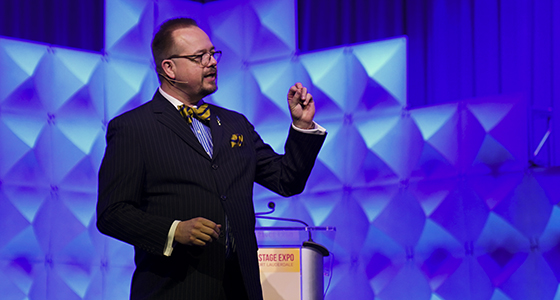Thoughts from David Grindle, USITT Executive Director
I’ve been through a variety of training and learning sessions in my career. From firearms safety to evacuation drills for theatres, training is a part of what we do. But recently I experienced the new reality of our world. While in Las Vegas for meetings, I was invited to the first Active Shooter Training at KÀ by Cirque du Soleil.
This training simulated an event happening elsewhere in the property while the show was going on. So the performers were in the midst of their scene, the crew was doing their work backstage, and performers were asked to be where they would be at that point in the show. Announcements were made, there were a few of us being the “audience” so that people had someone to announce to. It was as “real” as we could make it.
They did the simulation and then brought everyone back to the theatre to discuss what they had observed and learned. People commented on how to make things work better in their particular parts of the theatre, and the leadership team took the notes so that those comments could be incorporated the next time the drill was done.
I was struck by several observations. First, everyone took it seriously.
Perhaps because the events of Oct. 1 were still very fresh in our minds. There was no feeling expressed or exhibited that showed people thought this was unnecessary. They did their part.
Second, I was struck by the willingness of everyone to hear the concerns of each person. “If we have medical training, should we identify ourselves to help?” “If we are near an exit, should we leave or remain sheltered?” “How do we make sure to communicate to our non-English-speaking audience?” These questions were all fielded because each person’s concern was genuine and focused on how to try to prepare for an unthinkable or chaotic moment.
Lastly, I was struck listening to the senior leadership afterward as they discussed things. They were obviously concerned for the well-being of their staff, artists, and audience. They discussed how things could be more effectively communicated and how to better prepare everyone. There was no discussion of politics or opinions about shootings, only a focused discussion on how to best respond in the event of an incident.
Mark Shanda asked us all what an appropriate response is to the events that have happened in the last year. I shared my experience at KÀ because it is one response. There is no best response, there is only an effort for appropriate responses. I also happened to pick one show as an example, but they are not the only company that is taking this approach. Others are also running drills and preparing for possible scenarios.
If I’ve learned anything in the last 20 years, it is that there is very little that is unfathomable any more. We can all have our thoughts and views, but USITT views everything through the lens of theatre design and technology training. And so I encourage everyone to have these discussions at your theatre or place of work. The “what if” scenarios can sound far-fetched at times, but the preparation pays off. The particular scenario might not happen, but at some point an emergency of some type could happen and that preparation can be put in to action so that there is some sense of “knowing” what to do when nothing else is making sense.
